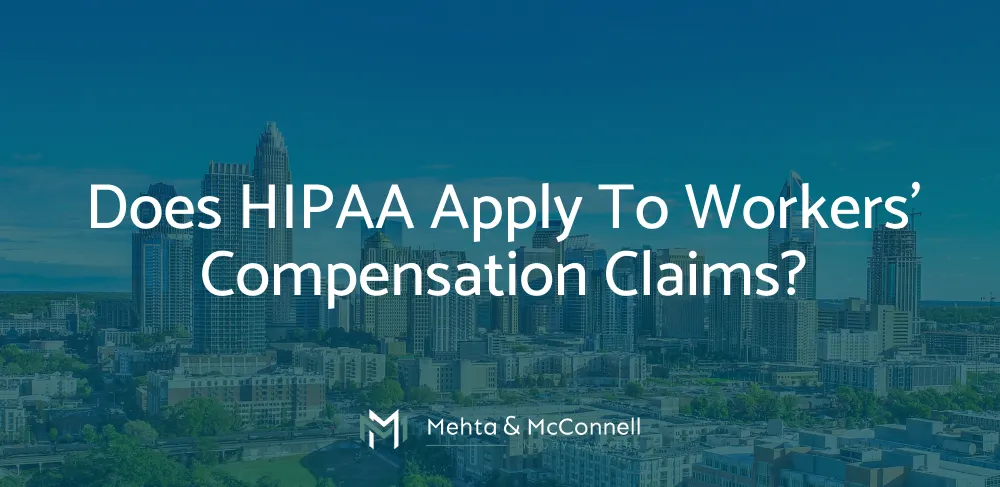 Workers' Compensation
Workers' Compensation
If you’ve been injured on the job in North Carolina, navigating the complexities of workers’ compensation can be daunting. Amidst concerns about medical privacy and legal protections, questions often arise about whether HIPAA applies to workers’ compensation claims.
At Mehta & McConnell, PLLC, we understand the importance of clarity and transparency regarding your legal rights. Let’s explore the legalities of HIPAA and workers’ compensation claims and what it means for you.
Understanding HIPAA and Workers’ Compensation
When it comes to safeguarding the privacy of medical information, the Health Insurance Portability and Accountability Act (HIPAA) is a critical piece of legislation. HIPAA establishes standards for protecting sensitive health information and outlines the rights of patients regarding the use and disclosure of their medical records.
In the context of workers’ compensation, HIPAA applies in nuanced ways. While the primary goal of HIPAA is to protect patient privacy, some exceptions allow for the disclosure of medical information in certain circumstances, including workers’ compensation claims.
Under North Carolina law, employers may obtain HIPAA information regarding an injured employee from their medical provider without written consent only as it relates to the injury covered by workers’ compensation.
The employer or their representative may also communicate with the employee’s physician’s office for billing purposes. Any misuse of the protected information is considered a HIPAA violation.
Does HIPAA Apply to Workers’ Comp in North Carolina?
The question of whether HIPAA applies to workers’ compensation claims is a common inquiry. While HIPAA governs the privacy and security of protected health information (PHI) in many healthcare contexts, its application to workers’ compensation cases is nuanced.
In North Carolina, workers’ compensation claims typically involve medical records and information relevant to the injury sustained on the job. While HIPAA’s privacy rules generally apply to healthcare providers, health plans, and other entities that handle PHI, there are exceptions regarding workers’ compensation.
Under the HIPAA Privacy Rule, covered entities are permitted to disclose PHI without individual authorization for workers’ compensation purposes. This means that healthcare providers and insurers may share relevant medical information with employers and workers’ compensation carriers as necessary for claims processing and evaluation.
Employer HIPAA Violations: Risks and Recourse
While HIPAA permits the disclosure of medical information for workers’ compensation claims, employers must adhere to guidelines to avoid potential violations. Unauthorized access to or mishandling employees’ medical records can have serious legal and ethical consequences.
If an employer breaches HIPAA regulations by improperly handling employees’ medical information, the affected individual may have legal recourse. The U.S. Department of Health and Human Services (HHS) oversees HIPAA enforcement and has the authority to investigate complaints and impose penalties for violations.
Penalties can range in severity depending on the level of intentional misconduct from $100 to $50,000 per violation. Several factors go into determining the severity of the violation and extent of the harm, which in extreme cases, could be considered criminal.
Your attorney can help you understand what your claim may be worth depending on the unique circumstances of the HIPAA and workers’ compensation violation.
Your Rights and Legal Action
If you’ve been injured on the job and are pursuing a workers’ compensation claim, it’s essential to understand your rights regarding the privacy of your medical information. HIPAA provides protections to ensure that sensitive health information is handled appropriately and disclosed only as necessary for claims processing.
If you believe your employer has violated HIPAA regulations in handling your medical records, you may have legal recourse. Consulting with an experienced workers’ compensation attorney can help you understand your rights and explore potential courses of action to address any breaches.
Why Choose Mehta & McConnell PLLC?
At Mehta & McConnell, PLLC, we are dedicated to advocating for the rights of injured workers. Here’s why you should trust us to handle your workers’ compensation claim:
- Experience. Our team has extensive experience navigating the complexities of workers’ compensation law. We understand the nuances of HIPAA and workers’ compensation claims.
- Compassionate representation. We approach each case with compassion and understanding, recognizing the challenges injured workers face. We are committed to providing personalized attention and support throughout the legal process.
- Results-driven advocacy. Our goal is to secure the best possible outcome for our clients. Whether through negotiation or litigation, we will tirelessly advocate for your rights and pursue the compensation you deserve.
- Accessible legal guidance. We believe in open communication and transparency. Our team is accessible to answer your questions, address your concerns, and provide guidance every step of the way.
If you’ve been injured on the job and need assistance with a workers’ compensation claim in North Carolina, don’t hesitate to contact Mehta & McConnell, PLLC. Let us put our experience and dedication to work for you, helping you navigate the legal process with confidence and peace of mind. Contact us today to schedule a consultation and learn more about how we can advocate for you.

